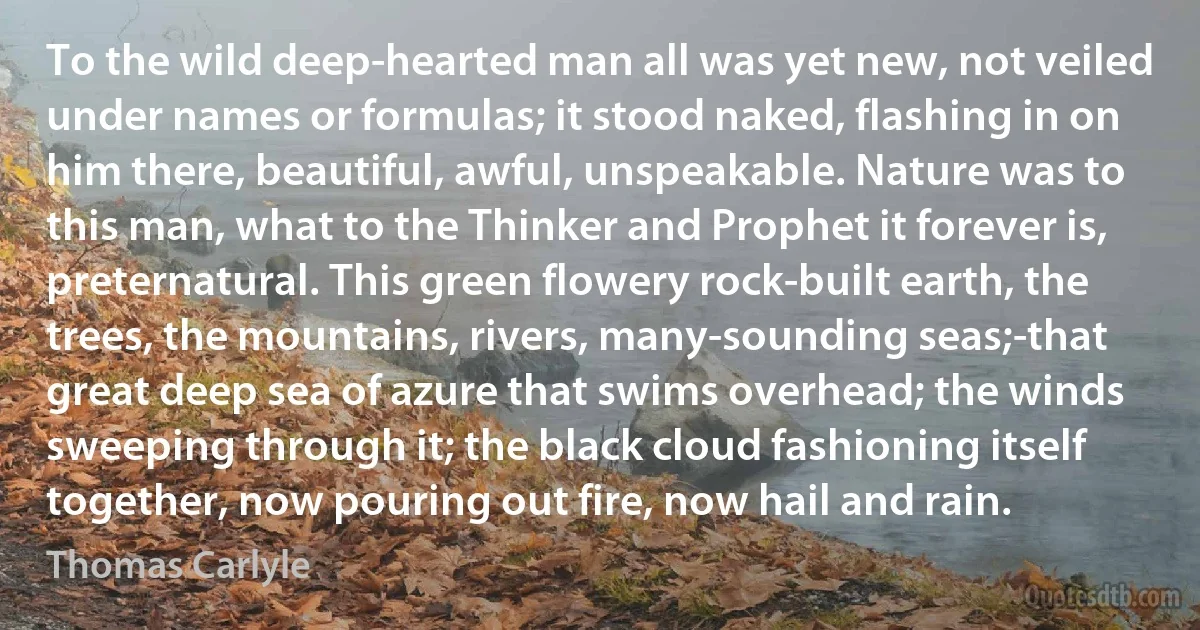Stand Quotes - page 53
Have you noticed that there are some people, who when they lose something, their first reaction is that it had to be stolen? First thing- "Hey! It was stolen!" It's an ego defense. They can't stand the fact that they might have been stupid enough to have lost something. And even if it's something that anyone would really want that much. "Hey! Who stole my collection of used bandages?! And they also got away with my nude pictures of Ernest Borgnine!"

George Carlin
There is a sort of dead-alive, hackneyed people about, who are scarcely conscious of living except in the exercise of some conventional occupation. ... They have no curiosity; they cannot give themselves over to random provocations; they do not take pleasure in the exercise of their faculties for its own sake; and unless necessity lays about them with a stick, they will even stand still. It is no good speaking to such folk: they cannot be idle, their nature is not generous enough; and they pass those hours in a sort of coma, which are not dedicated to furious moiling in the gold-mill.

Robert Louis Stevenson
It is the property of every Hero, in every time, in every place and situation, that he come back to reality; that he stand upon things, and not shows of things. According as he loves, and venerates, articulately or with deep speechless thought, the awful realities of things, so will the hollow shows of things, however regular, decorous, accredited by Koreishes or Conclaves, be intolerable and detestable to him.

Thomas Carlyle
The force that had been lent my father he honorably expended in manful well-doing. A portion of this planet bears beneficent traces of his strong hand and strong head. Nothing that he undertook to do but he did it faithfully and like a true man. I shall look on the houses he built with a certain proud interest. They stand firm and sound to the heart all over his little district.

Thomas Carlyle
Every toiling Manchester, its smoke and soot all burnt, ought it not, among so many world-wide conquests, to have a hundred acres or so of free greenfield, with trees on it, conquered, for its little children to disport in; for its all-conquering workers to take a breath of twilight air in? You would say so! A willing Legislature could say so with effect. A willing Legislature could say very many things! And to whatsoever 'vested interest,' or such like, stood up, gainsaying merely, "I shall lose profits,"-the willing Legislature would answer, "Yes, but my sons and daughters will gain health, and life, and a soul."-.

Thomas Carlyle
We are no longer instinctively driven to apprehend, and lay to heart, what is Good and Lovely, but rather to inquire, as onlookers, how it is produced, whence it comes, whither it goes. Our favourite Philosophers have no love and no hatred; they stand among us not to do, nor to create anything, but as a sort of Logic mills, to grind out the true causes and effects of all that is done and created.

Thomas Carlyle
In primitive society the rules of ceremonial purity observed by divine kings, chiefs, and priests agree in many respects with the rules observed by homicides, mourners, women in childbed, girls at puberty, hunters and fishermen, and so on. To us these various classes of persons appear to differ totally in character and condition; some of them we should call holy, others we might pronounce unclean and polluted. But the savage makes no such moral distinction between them; the conceptions of holiness and pollution are not yet differentiated in his mind. To him the common feature of all these persons is that they are dangerous and in danger, and the danger in which they stand and to which they expose others is what we should call spiritual or ghostly, and therefore imaginary. The danger, however, is not less real because it is imaginary; imagination acts upon man as really does gravitation, and may kill him as certainly as a dose of prussic acid.

James Frazer
For us [the young artists in Vitebsk, before 1920] Suprematism did not signify the recognition of an absolute form which was part of an already completed universal system, on the contrary; here stood revealed for the first time in all its purity the clear sign and plan for a definite new world never before experienced - a world which issues forth from our inner being and which is only now in the first stages of its formation, for this reason the square [ Malevich's Black and Red Square ] of suprematism became a beacon.

El Lissitsky
The bright side is that the conquering of color caste in America is America's own innermost desire. This nation early laid down as the moral basis for its existence the principles of equality and liberty. However much Americans have dodged this conviction, they have refused to adjust their laws to their own license. Today, more than ever, they refuse to discuss systematizing their caste order to mutual advantage, apparently because they most seriously mean that caste is wrong and should not be given recognition. They stand warm heartedly against oppression in all the world. When they are reluctantly forced into war, they are compelled to justify their participation to their own conscience by insisting that they are fighting against aggression and for liberty and equality.

Gunnar Myrdal
I'm able to paint so nice and thick with those big splodges that stay upright because I mix my own paint. I use the formula that the seventeenth-century painters used and I've added one or two things myself. A very important element is stand oil. I once got hold of a whole barrel full and I'm still using it. There are pots of it in all my studios, in New York, in Connecticut, in Monaco, and in Tuscany. [the oil had been found when an old paint shop closed down, in a] stock that had been there since the seventeenth century... I mix my oil paint with it, and I throw in a lot of eggs and some concentrated turpentine. It's as thick as homemade mayonnaise. When it dries it is as tough and hard as rubber.

Karel Appel



